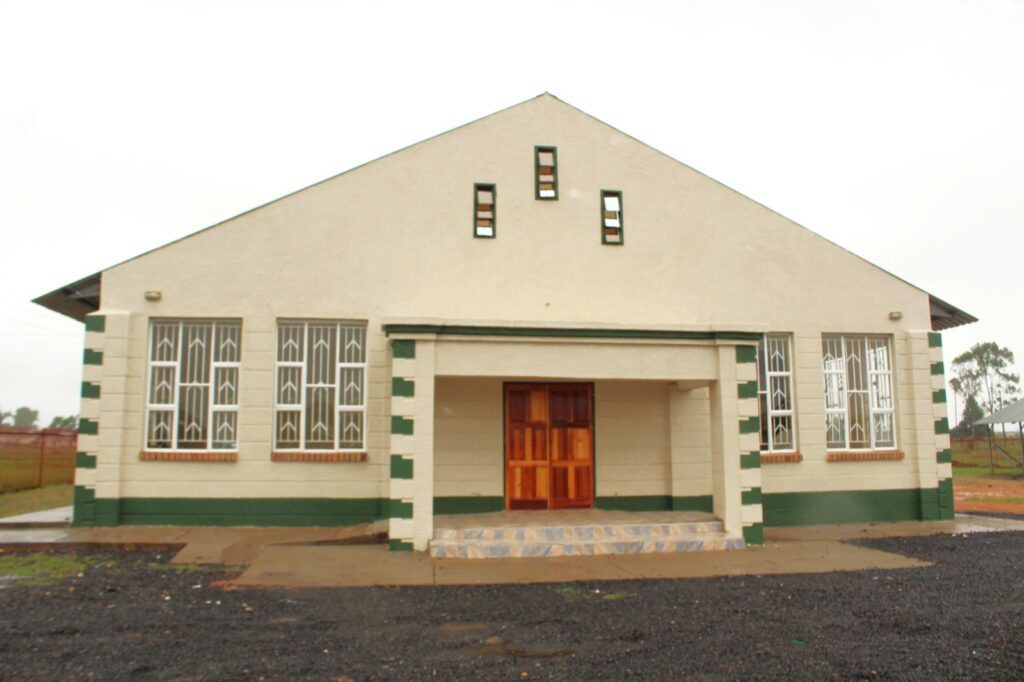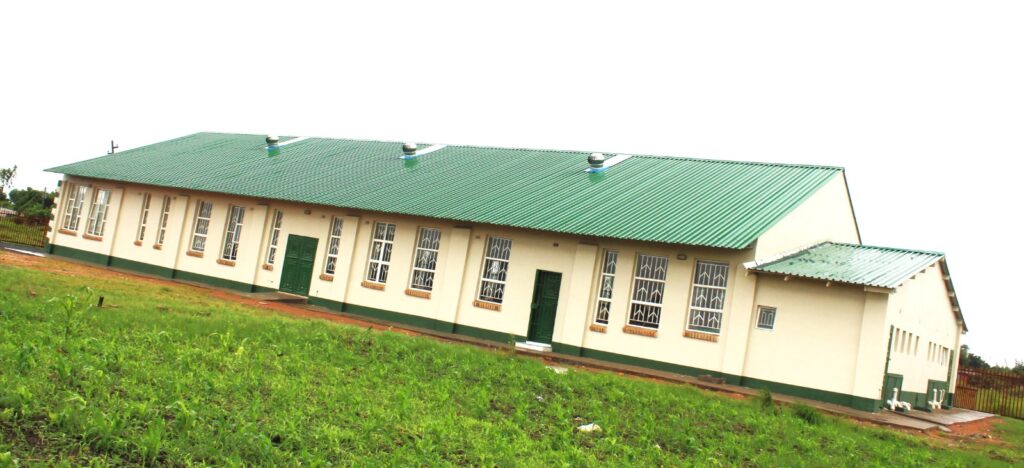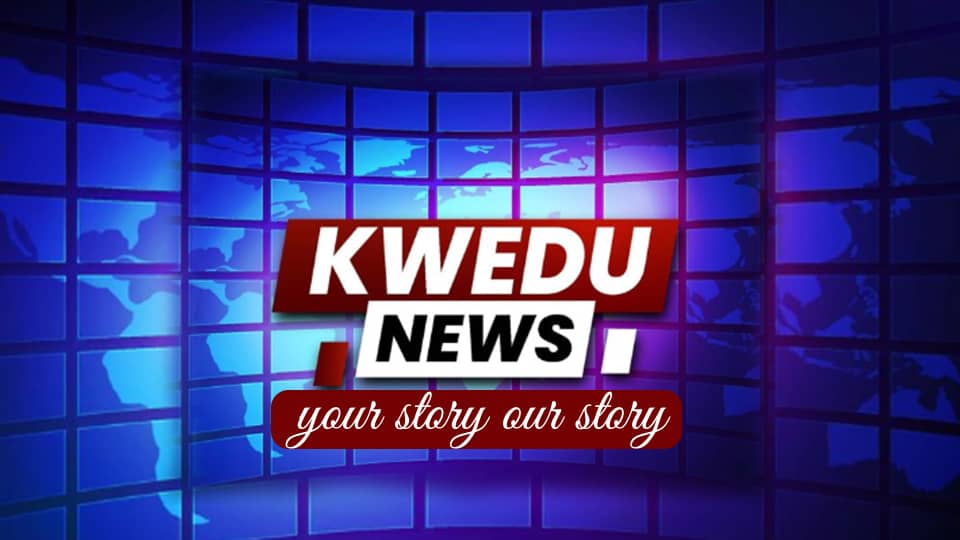MP salutes Ascot SDA for embracing inclusive ministering
By Dumisani Ndlovu
Mkoba South legislature, John Kuka has applauded Seventh Day Adventists Church Ascot branch for embracing an inclusive ministry which leave no one behind.
His sentiments emanates from a belief that God has created us as equally-valued people in His image.
The legislator was speaking at Ascot SDA Church Building Dedication Ceremony held on Saturday 23 December 2023.
“I am far more impressed to realise that here you are an inclusive ministry which enables, empowers and engages all persons within the worshipping community, regardless of ability. Being ‘inclusive’ of those with disabilities means valuing them,” he said.
Honourable Kuka highly appreciated the disability friendly environment existing at the church.
“Making churches accessible and services understandable is important, we could see sign-language interpreters making our differently abled people understanding, it is socially and religiously healthy. It is not enough for a church to call itself “inclusive,” without having wheelchair ramps we saw here,” said Honourable Kuka.
“ We do not want to create a ‘program’ that deals with disabilities, but a ministry that comes alongside all people loved and valued by God as SDA has shown us here,” he added.
Veteran disability activist, Moses Magazeni who was equally impressed by the church‘s gesture said an inclusive ministry is not a program.
“It is not about creating a special class or a separate ministry or even identifying ‘the disabled’ as an object of ministry. It is opening the doors of the Church to include those with disabilities to fully participate in the life of the Body of Christ as we are witnessing here and at Mtapa SDA church branch were the concept started,” said the visually impaired Magazeni.
Mr Magazine who is also an internal advisor of the first ever Zimbabwe International Disability Inclusive Arts Festival (ZIDIAC) set to be officially launch in 2024 further said all people with disabilities are looking for a place to belong, to be valued, to know and be known.
“We people with disabilities long to be part of a community that brings meaning, purpose, and opportunities to contribute as well as to receive. We are seeking a place that provides for a corporate expression of our faith in Christ that communicates. The gesture by SDA in collaboration with the Sibanda and Tagwireyi families as mentioned at the official opening of the-state-of –the-art church shows that we are not alone in our disability inclusive journey,” said the clear spoken,” Magazeni.
A ministry approach that is principally based on inclusion will be much more effective than a program-oriented one. Principles of inclusive ministries should not be restricted to a bible study or Sunday school class or specialized programs, but should be formative to all functioning and ministries of the Church.
Above: Learn how one church has reached out to people with developmental disabilities in their community to build friendships, grow spiritually, and welcome one another’s gifts.
Barriers to Inclusive Ministry
Barrier 1: Misunderstandings
A significant barrier to building inclusive ministries is misunderstandings and misconceptions regarding disabilities. Outdated notions, fears, misinformation and the discomfort of congregants may prevent people with disabilities being meaningfully and holistically engaged in the life of the local church. This is compounded by the fact that each disability diagnosis brings its own unique challenges and strategies. For example, some disabilities are physical, others are cognitive, or there may be a complex combination of various disabilities, both physical and cognitive. How a person appears, sounds, or acts, may “put people off” or cause others to remain at a distance. Close friendships and committed relationships are one of the greatest needs for many people with disabilities. Indeed, these are the deepest needs of most of us yet many people don’t face the same number of obstacles in establishing or maintaining these relationships as those with disabilities.
The key to overcoming misunderstandings and the establishment of God’s intention for inclusive ministries is through the study of scripture, education, prayer and perhaps most of all, simply building friendships with people with various abilities. There is no effective one-size-fits-all approach, whether the person has a disability or not. Being a community that makes room for people of all abilities requires an intentional and informed response.
Barrier 2: Age-Appropriate Ministry
Another barrier, especially for people with cognitive disabilities, is that often they are stigmatized as ‘angels’ or perpetual children. Therefore teaching materials and approaches are often patronizing and not age-appropriate. We must remember that regardless of the severity of someone’s disability, people have the right and the need to be responded to and treated according to who they are, not according to who they may be perceived to be. It means that we ensure that our tones are not condescending. We must be mindful of ‘voice’, phrases and words that we tend to use when talking to small children. It means that we seek to include persons with disabilities in conversations welcome their experiences as expressions of the full Body of Christ. While pictures, songs, and activities are needed and may be appropriate, we simply need to make sure they are honouring and respectful of a person’s age and communication ability. Setting people up as perpetual ‘infants’ is another way of saying that we have little or nothing to learn from them. In doing so, we may be closing ourselves off to the ways that God is looking to teach us about who He is and His love for us.
Barrier 3: Confusion between curing and healing
Historically, disability has been viewed as a disease, or ‘not normal’, or perhaps as the result of sin. Therefore, many people looking a ‘curing’ of some sort to occur. In other words, a complete removal or reversal of the ‘dis-ease’. The expectation is that in being cured the person will not longer need the assistance and support of the Church. This has been problematic for those with disabilities, and is more often than not the result of the onlooker’s own dis-ease with disability and perhaps with vulnerability and limitations. Persons with disabilities are not ‘sick’ and are frequently not looking for a ‘cure’.
Healing, holistically understood, is very different from curing. As Jesus demonstrates in Mark 2, the healing of the paralyzed man actually occurs when his sins are forgiven, not primarily when the man rises from his mat to walk. Healing is the restoration of the relationship between each person, God, self, and community. Jesus proceeds to cure the man in order to show that he has the power to forgive sin (true healing). Unfortunately, the church struggles with what it means to offer ongoing support to those who are not ‘cured’. However, God invites us each to participate in our own healing and the healing of all those around us. We are all needing healing in our lives, not just those with disabilities. Healing is something that the community can offer, especially to those with disabilities who are often marginalized and excluded by society. One of the most powerful healing opportunities is in a church is the willingness to create inclusive ministries. As people with disabilities are engaged and included in the church body many wounds are healed. The most frequent wounds are acceptance, the lack of true and meaningful relationships, and the opportunity to be meaningfully involved in community life. In turn, the church is restored to wholeness as the Body of Christ includes all of its members.
For a more in-depth discussion on Luke 2 and the issues of healing and curing, read “Crowd or Community of Belonging” here on the Disability and Faith Forum.
Barrier 4: What it means to declare and respond to the gospel
We are often very linear in our approach to the gospel. Receiving the Good News is often viewed as verbal and intellectual assent to certain doctrines or beliefs. However, those with cognitive disabilities may have difficulty in understanding the gospel in this form and people with physical challenges may not be able to communicate it in a way that is expected. So, we need to discover other modalities of what it means to declare and respond to the gospel. It may mean that we need to explore how to preach a tactile gospel – one that employs an array of senses – touch, smell, sound and the sensory atmospheres. In addition, we need to ask the question “what is the person learning about the grace, mercy, gentleness, acceptance and salvation of God?” by how they experience us in relationship with them as a community. Again, the benefit to the community is that we come to appreciate the fullness of the gospel – that Christ did not come only for those with a certain IQ or communication ability. As we come to accept this, we come to accept the grace of God in our own lives in a new and powerful way.
Overcoming barriers
When working with children with disabilities, one of the best sources of information for education and help in developing strategies are the parents themselves. Frequently, parents are just waiting to be asked the best way to support them or their children. Parents can be a tremendous source of information on how to effectively create an inclusive ministry. This can be an important contact for both the church and the family. Too often, parents feels isolated, misunderstood and at worst, abandoned by the church when they have a child with special needs. The conversation itself can be a vehicle to reconnect and not only support the children but the entire family.
In the case of an adult with disabilities, often the person herself is able to give insight and guidance if we just take the time to ask, listen, and watch. A motto that is helpful for any church to apply while building inclusive ministries is “Nothing about me without me”. This simply means the person with the disability is included in the circle of communication and planning, regardless of ability. This will help keep the church ‘person-centred’ as it seeks to minister to the person with a disability. The challenges are that although a ministry can be well intentioned, to attempt to make ministry accessible without the input of people impacted by these changes often just furthers the separation of the person and their community.
Above: Erik Carter, Associate Professor in the Department of Special Education at Vanderbilt University in Nashville TN, shares his personal insights into the opportunity that churches have to help Build Communities of Belonging for people of all abilities.
What about the cost?
One of the reasons that many churches resist establishing inclusive ministries is the fear of what it costs. While there may be costs associated with making the physical building accessible (see the AODA for Ontairo legislation) an inclusive ministry does not need to be a separately funded program. Nor does it necessarily need to increase workload or tax already overstretched resources. In fact, in many cases the opposite can be discovered as the skills, gifts and talents of a group of people previously overlooked and willing to serve are unlocked. There is no role that people are precluded from simply because of their disability. We have seen people with even more significant cognitive disabilities actively contribute in the roles of greeting, ushering, church cleaning and maintenance, helping with setting up, teacher’s helper, worship team participant, and prayer.
It has been exciting to see that as churches embrace inclusive ministries they have found meaningful places of service and ministry for people with disabilities. At times, it takes a creative approach and simple involvement can be the best place to start. Opening a small group, a ministry team, an event to someone with a disability can be a powerful experience. The question often is “what about the impact of the other members of the group?” or for those with cognitive disabilities, “but do they understand?” Truthfully there can be challenges, but they should not be barriers. The benefit of being ‘in community’ itself is significant. Both the person and the church benefit greatly. In the majority of cases, every person is able to participate at some level. The limits of opportunity are often only held back because of our own imagination. However, the blessings are experienced by all.
We would love to come alongside you in this process.
Resources
We are able to provide materials for developing a disability ministry, supporting families and helping your Church understand the importance of ministries that are inclusive to those with disabilities. We have a wide array of resources available online for download or reference at www.christian-horizons.org or right here at the Disability and Faith Forum.
Speakers
Whether for a message at your local church, as part of a smaller group, to ministry boards on the importance of inclusion or accessibility, or at events, we can speakers on a wide range of topics including:
A theology of disability
Understanding the impact and supports required for various disabilities
Supporting families with disable children
Understanding and compliance with the Accessibility for Ontarians with Disabilities Act (AODA)
Global ministry opportunities
Opportunities
Christian Horizons has many opportunities locally, nationally and internationally for churches and groups to be significantly involved and aware of justice issues related to people with disabilities. From child sponsorship, to volunteering at a local home, to helping to raise funds for needed projects such as micro-financing or building projects around the world, or in helping make a local family retreat for families impacted by disabilites possible, the ways to get involved are nearly endless.
Send us an email or check out our website today to learn more
Above: The Christian Horizons Family Retreat is a unique opportunity for families living with disability to enjoy a vacation together in a safe, fun and rejuvenating atmosphere.
[1] Yong, Amos Theology and Down syndrome: Reimaging Disability in Late Modernity, Baylor University Press, 2007 (3) quoting Stanley Hauerwas, who uses the old term ‘retarded’ rather than disabled
Kwedu Classics
Your story our story



